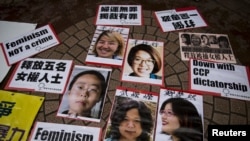Amid China’s deepening crackdown on labor activists, Wei Zhili, the editor of an online labor rights advocacy platform called iLabour, was officially arrested on the charge of “picking quarrels and provoking trouble” on Friday – almost five months after he was taken away from his home in China’s southern city of Guangzhou.
Police presented a statement allegedly made by Wei to dismiss the lawyer of his family’s choice – a decision his family said is “clearly against his will.”
“We are afraid that the police may have tortured him and threatened him so that he decided to unhire that lawyer,” one of Wei’s family members told VOA over the weekend anonymously.
Legal Presentation Denied?
Wei’s family said they feel “sad and hopeless,” fearing that Wei has been deprived of his basic rights to seek legal presentation or his next government-appointed lawyer will not look after his best interest.
Wei’s wife Zheng Churan, a well-known feminist in China, is barred from talking to foreign media about her husband’s case. Three months ago, she began a running campaign with a goal to complete 10,000 kilometers and hopes that her loved one will be set free by the time she meets the goal.
If convicted, Wei may face up to a 10-year jail term, according to the lawyer of his family’s choice, whose requests to meet with his client were rejected twice by local police.
Two of Wei’s colleagues – Yang Zhengjun and Ke Chengbing, who were also seized by police from Shenzhen respectively in January and March – may face a similar fate, according to rights groups, which have been demanding the immediate release of the three journalists, dedicated to labor rights.
The three, known as “iLabour Three,” had used the news outlet to publish information on the cases of migrant workers from Hunan province who had contracted pneumoconiosis – an occupational lung disease, while also counseling them about defending their labor rights and petitioning over their grievances.
Set iLabour Three Free
"These journalists were serving the public interest by exposing life-threatening labor violations, and therefore they should never have been arrested,” said Christophe Deloire, Secretary-General of Reporters Without Borders (RSF) in a press statement released last week.
He insisted that the Chinese Constitution “enshrines freedom of the press and safe working conditions.”
RSF estimated that “at least 114 journalists and bloggers are currently imprisoned in life-threatening condition in China.”
In its 2019 World Press Freedom Index, the international group ranks China’s level of press freedom the 177th out of a total of 180 countries, which suggests China’s reporting environment only outperforms that in Eritrea, North Korea and Turkmenistan.
Sweeping Crackdown
Also, a group of online campaigners, which run a Facebook page titled Global Support for Disappeared Left Activists in China, noted that, since last July’s Jasic Incident, more than 130 labor rights activists have been detained or disappeared in China. Over 50 of them remain missing or in custody.
The Jasic incident was a month-long labor rights conflict, in which, workers from Jasic Technologies Co in Shenzhen, dissatisfied with what they alleged were low pay and poor working conditions, staged protests and sought to form a labor union.
Their calls drew support from students and professors at more than 20 universities. The Facebook group says more than 60 workers and supporters ended up being detained.
China's state-controlled Xinhua news, in August, placed the blame on labor groups and foreign forces, saying a Shenzhen-based labor center that partners with Hong Kong-based Worker Empowerment, fanned the protests. It failed to mention that the workers were protesting due to labor rights violations and state violence.
Since then, the group observed that the authorities’ targets of arrests have ranged from worker organizers, leftist students, labor organizations staff and even social workers.
Analysts noted that the detention of workers and supporters, plus the state media’s efforts to discredit them, showed the lengths Chinese authorities would go to, to crush worker disputes.
And China’s crackdown on labor activists has become so widespread that it’s hard to tell what activities are viewed by the authorities as crossing the red line, said Li Qiang, founder and executive director of China Labor Watch.
Riskier Labor Activism
In other words, anything that is beyond the Communist Party’s control will threaten the party’s rule and risk being suppressed, Li Qiang added.
“The Communist Party is concerned that, once highly-educated students or intellectuals with ideology join hands with the working class and get involved in the workers’ movement, the situation may get out of control and become detrimental [to its rule]. What worries the party the most is workers groups being organized,” said Li, who is currently based in New York.
Caught in the government’s crackdown, labor rights activists in China face an even more unclear and risker fate if they continue their activism, Li said.




